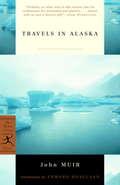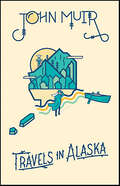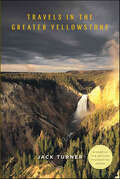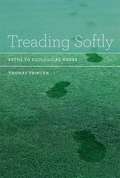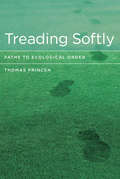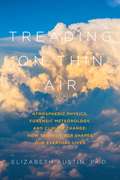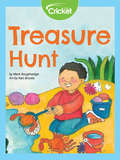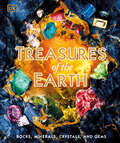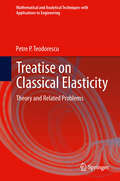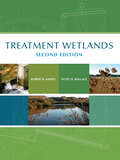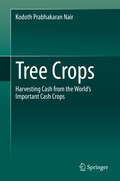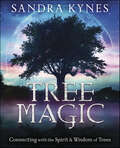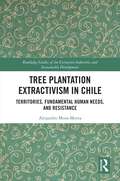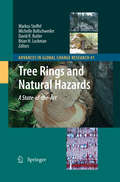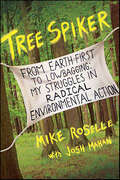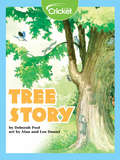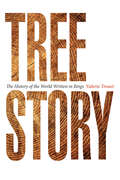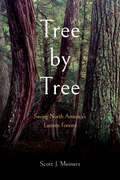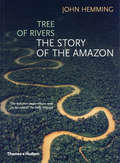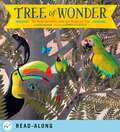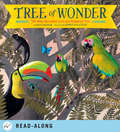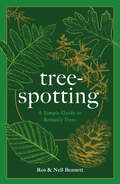- Table View
- List View
Travels in Alaska
by John Muir Edward HoaglandIn the late 1800s, John Muir made several trips to the pristine, relatively unexplored territory of Alaska, irresistibly drawn to its awe-inspiring glaciers and its wild menagerie of bears, bald eagles, wolves, and whales. Half-poet and half-geologist, he recorded his experiences and reflections in Travels in Alaska, a work he was in the process of completing at the time of his death in 1914. As Edward Hoagland writes in his Introduction, "A century and a quarter later, we are reading [Muir's] account because there in the glorious fiords . . . he is at our elbow, nudging us along, prompting us to understand that heaven is on earth--is the Earth--and rapture is the sensible response wherever a clear line of sight remains."This Modern Library Paperback Classic includes photographs from the original 1915 edition.From the Trade Paperback edition.
Travels in Alaska
by John MuirTravels in Alaska is part of a series that celebrates the tradition of literary naturalists—writers who embrace the natural world. In this collection, originally published in 1915, John Muir captures the beauty and intensity of Alaskan wilderness and its people from his travels between 1879 and 1890. John Muir’s strength lies in delicately mapping the intimate connection between the person and natural world, and awakening his readers to that reality. With an increasing global focus on the environment, and humans’ role in protecting it, there’s never been a finer time to reacquaint oneself with John Muir’s writings.
Travels in the Greater Yellowstone
by Jack TurnerAward-winning nature writer Jack Turner directs his attention to one of America's greatest natural treasures: the Greater Yellowstone Ecosystem. Comprised of two national parks, three national wildlife refuges, parts of six national forests, and eleven wilderness areas, Greater Yellowstone is a vast array of differing environments and geographies.In a series of essays, Turner explores this wonderland, venturing on twelve separate trips in all seasons using various modes of travel: hiking, climbing, skiing, canoeing lakes, floating rivers, and driving his way across the landscape. He treks down the Teton Range, picks up the Oregon Trail in the Red Desert, and floats the South Fork of the Snake River. Along the way he encounters a variety of wildlife: moose, elk, trout, and wolves. From the treacherous mountains in the dead of winter, to lush river valleys in the height of fishing season, his words and steps trace one of the most American of experiences---exploring the West.Turner, who has lived in Grand Teton for three decades, designates Greater Yellowstone as ground zero for the country's conflict between preservation and development. At a time when the battle to preserve a wild and natural environment is relentless, his accounts of the areas conflicts with alien species, logging, real estate, oil, and gas development are alarming.A mixture of adventure, nostalgia, and Americana, Turner's rare experiences and evocative writing transform the sights and sounds of Greater Yellowstone into an intimate narrative of travel through America's most beloved lands. Praise for Teewinot:"Bursting with a sense of place...a rewarding reading experience replete with ravishing observations of nature." - Publishers Weekly"...a measured luxuriance in the landscape, a love song to the natural history of a place...Turner's writing is muscular, never swaggering, and almost lyrical, summoning a Teton Range in its rightful, sublime austerity." - Kirkus Reviews"Teewinot is a rare book. The wonderful accounts of mountaineering serve as armature not only for Turner's meditative reverence for the Grand Tetons and his often evocative prose but also for an uncommon density of knowledge of place..."- Peter Matthiessen, author of Tigers in the Snow"This is, simply stated, a wonderful and utterly engaging book."- Jim Harrison, author of Dalva and The Road Home"Each place must find its muse. The Tetons have found theirs and his name is Jack Turner." - Terry Tempest Williams, author of Coyote's Canyon
Treading Softly: Paths to Ecological Order
by Thomas PrincenAuthor says we need a new normal, a new ecological order that is actually economical with resources, that embraces limits, that living as a long-term relationship with the planet, a connection to fresh, free-flowing water, fertile soil, and healthy food.
Treading Softly: Paths to Ecological Order
by Thomas PrincenHow to imagine and then realize an ecological order based on living within our biophysical means. We are living beyond our means, running up debts both economic and ecological, consuming the planet's resources at rates not remotely sustainable. But it's hard to imagine a different way. How can we live without cheap goods and easy credit? How can we consume without consuming the systems that support life? How can we live well and live within our means? In Treading Softly, Thomas Princen helps us imagine an alternative. We need, he says, a new normal, an ecological order that is actually economical with resources, that embraces limits, that sees sustainable living not as a “lifestyle” but as a long-term connection to fresh, free-flowing water, fertile soil, and healthy food. The goal would be to live well by living well within the capacities of our resources. Princen doesn't offer a quick fix—there's no list of easy ways to save the planet to hang on the refrigerator. He gives us instead a positive, realistic sense of the possible, with an abundance of examples, concepts, and tools for imagining, then realizing, how to live within our biophysical means.
Treading on Thin Air: How Weather Shapes Our Everyday Lives
by Elizabeth AustinWeather is an inescapable part of our daily lives, from the nuances of air travel to the breadth of human history. Our past, present, and future is intimately rooted is weather and climate. Weather, water, and climate. How we feel, how productive we are, even our sheer existence, depends on these three things. The United States economic activity varies annually by 1.7% due to weather--that is more than $500 billion dollars each year! Weather applications on mobile devices are the second most popular 'apps' - more popular than social networking, maps, music,and news. In Treading on Thin Air, Dr. Elizabeth Austin, a world-renowned atmospheric physicist, reveals how the climate is intimately tied to our daily lives. The effects and impacts of weather on humans, society and the planet are changing with the times. Dr. Austin will demystify climate change, revealing what is really happening with our climate and why, whether it is El Nino, tornadoes, floods or hurricanes. Weather and society are at its most fascinating at extremes, and as Dr. Austin is one of a handful of forensic meteorologists around the globe. She has been called upon to investigate plane crashes, murders, wildfires, avalanches, even bombing cases. Drawing upon her rich experiences, Austin's Treading on Thin Air promises to be an enlightening and informative journey through the wild word of weather.
Treasure Hunt
by Mark RoughsedgeTide pools are filled with such amazing creatures! Young children will love looking at beautiful art as they learn about all the different animals that live in these treasure troves.
Treasures of the Earth: Rocks, Minerals, Crystals, and Gems
by DKDig down into the history of rocks, minerals, and other treasures and uncover the stories behind these marvelous materials.From dazzling gems to beautiful buildings, this book for children aged 9+ is filled with rocks and minerals, each one with a tale to tell. Treasures of the Earth is a tale of our fascination with precious things–how they were made, how we’ve used them and how their legends grow with each year that passes. Packed with striking visuals, gems of geological information, and stories from cultures all around the world, this book is a must-have for budding rockhounds and curious kids.This all-encompassing rock and gem book for kids offers:An impressive collection of gems, rocks, and crystals, from their natural state to polished perfection.Facts on every page that explain how the shapes, patterns, and colors of rocks and minerals are formed.Contents organized by different rock and gem types, for example, Native Elements, Organic Gems, and Gemstones.What gem was more precious than gold to Chinese emperors? Who suffered the curse of the Hope Diamond? And why did Burmese soldiers insert rubies under their skin before battle? This book will answer all this and more, through colorful photography of rocks and artifacts, and gorgeous illustrations that bring the stories to life.
Treatise on Classical Elasticity: Theory and Related Problems
by Petre P. TeodorescuDeformable solids have a particularly complex character; mathematical modeling is not always simple and often leads to inextricable difficulties of computation. One of the simplest mathematical models and, at the same time, the most used model, is that of the elastic body - especially the linear one. But, notwithstanding its simplicity, even this model of a real body may lead to great difficulties of computation. The practical importance of a work about the theory of elasticity, which is also an introduction to the mechanics of deformable solids, consists of the use of scientific methods of computation in a domain in which simplified methods are still used. This treatise takes into account the consideration made above, with special attention to the theoretical study of the state of strain and stress of a deformable solid. The book draws on the known specialized literature, as well as the original results of the author and his 50+ years experience as Professor of Mechanics and Elasticity at the University of Bucharest. The construction of mathematical models is made by treating geometry and kinematics of deformation, mechanics of stresses and constitutive laws. Elastic, plastic and viscous properties are thus put in evidence and the corresponding theories are developed. Space problems are treated and various particular cases are taken into consideration. New solutions for boundary value problems of finite and infinite domains are given and a general theory of concentrated loads is built. Anisotropic and non-homogeneous bodies are studied as well. Cosserat type bodies are also modeled. The connection with thermal and viscous phenomena will be considered too. Audience: researchers in applied mathematics, mechanical and civil engineering.
Treatment Wetlands
by Scott Wallace Robert H. KadlecCompletely revised and updated, Treatment Wetlands, Second Edition is still the most comprehensive resource available for planning, designing, and operating wetland treatment systems. It provides engineers and scientists with a complete reference source that includes: detailed information on wetland ecology, design for consistent performance, site specific studies, estimated costs, construction guidance and operational control through effective monitoring. Case histories of operational wetland treatment systems illustrate the variety of design approaches presented allowing readers to tailor them to the needs of their projects.
Treaty Implementation for Sustainable Development: NAFTA and Sustainable Development
by Kong, Hoi L. and Wroth, L. Kinvin Hoi L. Kong L. Kinvin WrothThe North American Free Trade Agreement (NAFTA) and its companion agreement, the North American Agreement on Environmental Cooperation (NAAEC), provide important and often underappreciated protection for the environmental laws of the Party states: Canada, Mexico, and the United States. On the twentieth anniversary of NAFTA's ratification, this book assesses the current state of environmental protection under those agreements. Bringing together scholars, practitioners, and regulators from all three Party states, it outlines the scope and process of NAFTA and NAAEC, their impact on specific environmental issues, and paths to reform. It includes analyses of the impact of the agreements on such matters as bioengineered crops in Mexico, assessment of marine environmental effects, potential lessons for China, climate change, and indigenous rights. Together, the chapters of this book represent an important contribution to the global conversation concerning international trade agreements and sustainable development.
Tree Crops: Harvesting Cash from the World's Important Cash Crops
by Kodoth Prabhakaran NairThis book paints a wide canvas of the immense global economic potential of ten most important cash generating crops spread over Asia, Africa and Latin America, namely, Arecanut, Cashew Nut, Coconut, Cinchona, Cocoa, Coffee, Tea, Oil Palm, Rubber and Wattle. It provides a cross-sectoral, multi-scale assessment of the status of these crops, from seed to dining table, an invaluable treatise on the subject. Structured to be an invaluable tool for the inquisitive researcher, an ardent student, and, an insightful policy maker.
Tree Day: A Story of 24 Hours and 24 Arboreal Lives (Earth Day)
by Meg LowmanAn hourly guide that spotlights twenty-four trees as they root, flower, and host diverse forest life. In this short book, treetop explorer Meg Lowman guides us through a global forest. Each chapter of Tree Day introduces a single tree during a single hour, highlighting twenty-four species from around the world. In the dark of Yemen’s night, it is too early to see the red sap from which the dragon’s blood tree gets its name. But if we watch closely, we will see nocturnal geckos carry the trees’ pollen in their snouts. Later, in the Pacific Northwest, we climb the world’s tallest species, the coastal redwood. The morning fog is a reminder that redwoods absorb water through their roots and canopies, helping them survive such heights. The sun is already low in the sky on an autumn afternoon. Given the darkness of this New England forest, the sugar maple’s leaves have stopped producing chlorophyll that converts light into energy—and green gives way to vivid crimson foliage. After many hours of boiling, the maple sap makes delicious maple syrup. As the sun sets in Mexico, we observe the origin of another treat, chocolate. The cocoa tree’s flowers sprout along its trunk and branches, allowing easy access for tiny insects like midges that pollinate the tree and start the process of making delicious food for humans, monkeys, bats, and squirrels. By the end of our tree day, we will understand that trees are the silent caretakers of our planet, providing us with medicines, foods, machinery for making fresh water and oxygen, and more. For each hour, celebrated artist Thibaud Hérem has depicted these trees with gorgeous pen and ink illustrations. Working together to narrate and illustrate these unique moments in time, Lowman and Hérem have created an engaging read that is a perfect way to spend an hour or two—and a true gift for anyone who has ever looked up at a tree in wonder.
Tree Magic: Connecting with the Spirit & Wisdom of Trees
by Sandra Kynes60+ Trees to Deepen Your Connection with NatureTrees provide a gateway into a wider world of spirit and magic. This book helps you explore their timeless mysteries and work with their unique energy. Popular author Sandra Kynes shows you how to connect with the wonder of the forest and develop a deeper understanding and relationship with trees.This practical guide introduces you to more than sixty varieties of trees, providing illustrations, lore, botanical and historical information, ritual and magical uses, associated deities, and more. Sandra offers an abundance of resources, including correspondence charts, tree and rune calendars, and the Celtic ogham. Learn about tools from the woods like staffs, wands, and wreaths. Discover what items you can use to connect to a particular tree when it's not available in your area. Whether you're looking for a tree aligned with Venus or one to aid your divination, Tree Magic is the ideal resource to bring the magic, spirit, and wisdom of trees into your life.
Tree Plantation Extractivism in Chile: Territories, Fundamental Human Needs, and Resistance (Routledge Studies of the Extractive Industries and Sustainable Development)
by Alejandro Mora-MottaThis book examines how extractivism transforms territories and affects the well-being of rural people, drawing on in-depth fieldwork conducted on tree plantations in Chile.The book argues that pine and eucalyptus monoculture plantations in southern Chile are a form of extractivism representing a mode of nature appropriation that captures large amounts of natural resources to produce wooden-based raw materials with little processing and an export-oriented focus. The book discusses the nexus of extractivism, territorial transformations, well-being, and emerging resistances using a participatory action research methodological approach in the Region of Los Ríos, southern Chile. The findings show how the configuration of an extractivist logging enclave generated a substantial and irrevocable reordering of human-nature relations, resulting in the territorial and ontological occupation of rural places that disrupted the fundamental human needs of peasants and indigenous people. The book maintains that Chile's green growth development approach does not challenge the consolidated tree plantation enclave controlled by large multinationals. Instead, green growth legitimises the extractivist logic. The book draws parallels with other countries and regions to contribute to wider debates surrounding these topics.This book will be of great interest to students and scholars of the extractive industries, development studies, political ecology, and natural resource governance.
Tree Rings and Natural Hazards
by David R. Butler Brian H. Luckman Markus Stoffel Michelle BollschweilerThe initial employment of tree rings in natural hazard studies was simply as a dating tool and rarely exploited other environmental information and records of damage contained within the tree. However, these unique, annually resolved, tree-ring records preserve valuable archives of past earth-surface processes on timescales of decades to centuries. As many of these processes are significant natural hazards, understanding their distribution, timing and controls provides valuable information that can assist in the prediction, mitigation and defence against these hazards and their effects on society. Tree Rings and Natural Hazards provides many illustrations of these themes, demonstrating the application of tree rings to studies of snow avalanches, rockfalls, landslides, floods, earthquakes, wildfires and several other processes. Several of the chapters are "classic studies", others represent recent applications using previously unpublished material. They illustrate the breadth and diverse applications of contemporary dendrogeomorphology and underline the growing potential to expand such studies, possibly leading to the establishment of a range of techniques and approaches that may become standard practice in the analysis of natural hazards in the future.
Tree Spiker: From Earth First to Lowbagging: My Struggles in Radical Environmental Action
by Mike Roselle Josh MahanLauded by some, despised by others, Mike Roselle is one of the most controversial figures in the crusade to protect the environment. Mike has succeeded in stopping a lumber project by spiking trees, struggled with death threats and the car bombing of fellow activist Judi Bari, endured countless days in jail, infiltrated the Nevada Test Site to delay nuclear bomb detonation, helped put a gas mask on Mount Rushmore's George Washington, and aided actor Woody Harelson in draping a banner up on the Golden Gate Bridge. He has spent over thirty years fighting back against big business, negligent management and the lawless actions of the government itself for the safety and preservation of our great earth. Tree Spiker: From Earth First! to Lowbagging: My Struggles in Radical Environmental Action is a fascinating autobiography from the front lines of a radical movement.
Tree Story
by Deborah PoolAt every stage in a tree's life cycle, it provides a home for many animals and insects.
Tree Story: The History of the World Written in Rings
by Valerie TrouetWhat if the stories of trees and people are more closely linked than we ever imagined?Winner of the World Wildlife Fund's 2020 Jan Wolkers PrizeOne of Science News's "Favorite Books of 2020" A New York Times "New and Noteworthy" BookA 2020 Woodland Book of the YearGold Winner of the 2020 Foreword INDIES Award in Ecology & EnvironmentBronze Winner of the 2021 Independent Publisher Book Award in Environment/EcologyPeople across the world know that to tell how old a tree is, you count its rings. Few people, however, know that research into tree rings has also made amazing contributions to our understanding of Earth's climate history and its influences on human civilization over the past 2,000 years. In her captivating book Tree Story, Valerie Trouet reveals how the seemingly simple and relatively familiar concept of counting tree rings has inspired far-reaching scientific breakthroughs that illuminate the complex interactions between nature and people.Trouet, a leading tree-ring scientist, takes us out into the field, from remote African villages to radioactive Russian forests, offering readers an insider's look at tree-ring research, a discipline known as dendrochronology. Tracing her own professional journey while exploring dendrochronology's history and applications, Trouet describes the basics of how tell-tale tree cores are collected and dated with ring-by-ring precision, explaining the unexpected and momentous insights we've gained from the resulting samples.Blending popular science, travelogue, and cultural history, Tree Story highlights exciting findings of tree-ring research, including the fate of lost pirate treasure, successful strategies for surviving California wildfire, the secret to Genghis Khan's victories, the connection between Egyptian pharaohs and volcanoes, and even the role of olives in the fall of Rome. These fascinating tales are deftly woven together to show us how dendrochronology sheds light on global climate dynamics and uncovers the clear links between humans and our leafy neighbors. Trouet delights us with her dedication to the tangible appeal of studying trees, a discipline that has taken her to austere and beautiful landscapes around the globe and has enabled scientists to solve long-pondered mysteries of Earth and its human inhabitants.
Tree by Tree: Saving North America's Eastern Forests
by Scott J. MeinersTree by Tree is a warning and a toolkit for the future of forest recovery. Scott J. Meiners investigates the critical biological threats endangering tree species native to the forests of eastern North America, providing a needed focus on this plight. Meiners suggests that if we are to save our forests, the first step is to recognize the threats in front of us. Meiners focuses on five familiar trees—the American elm, the American chestnut, the eastern hemlock, the white ash, and the sugar maple—and shares why they matter economically, ecologically, and culturally. From outbreaks of Dutch elm disease to infestations of emerald ash borers, Meiners highlights the challenges that have led or will lead to the disappearance of these trees from forests. In doing so, he shows us how diversity loss often disrupts intricately balanced ecosystems and how vital it is that we pay more attention to massive changes in forest composition.With practical steps for the conservation of native tree species, Tree by Tree offers the inspiration and insights we need to begin saving our forests.
Tree of Rivers: The Story of the Amazon
by John Hemming"In his long career of exploration and scholarship, Hemming has become a powerful advocate for the Amazon."--The New York Times, John Hemming Amazonia is one of the most magnificent habitats on earth. Containing the world's largest river, with more water and a broader basin than any other, it hosts a great expanse of tropical rain forest, home to the planet's most luxuriant biological diversity. The human beings who settled in the region 10,000 years ago learned to live well with its bounty of fish, game, and vegetation. It was not until 1500 that Europeans first saw the Amazon, and, unsurprisingly, the rain forest's unique environment has attracted larger-than-life personalities through the centuries. John Hemming recalls the adventures and misadventures of intrepid explorers, fervent Jesuit ecclesiastics, and greedy rubber barons who enslaved thousands of Indians in the relentless quest for profit. He also tells of nineteenth-century botanists, fearless advocates for Indian rights, and the archaeologists and anthropologists who have uncovered the secrets of the Amazon's earliest settlers. Hemming discusses the current threat to Amazonia as forests are destroyed to feed the world's appetite for timber, beef, and soybeans, and he vividly describes the passionate struggles taking place in order to utilize, protect, and understand the Amazon.
Tree of Wonder
by Kate Messner Simona MulazzaniDeep in the forest, in the warm-wet green, 1 almendro tree grows, stretching its branches toward the sun. Who makes their homes here?2 great green macaws,4 keel-billed toucans,8 howler monkeys,16 fruit bats,32 fer-de-lance vipers,64 agoutis,128 blue morpho butterflies,256 poison dart frogs,512 rusty wandering spiders,1,024 leafcutter ants.Count each and every one as life multiplies again and again in this lush and fascinating book about the rainforest.
Tree of Wonder: The Many Marvelous Lives of a Rainforest Tree
by Kate Messner Simona MulazzaniDeep in the forest, in the warm-wet green, 1 almendro tree grows, stretching its branches toward the sun. Who makes their homes here?2 great green macaws,4 keel-billed toucans,8 howler monkeys,16 fruit bats,32 fer-de-lance vipers,64 agoutis,128 blue morpho butterflies,256 poison dart frogs,512 rusty wandering spiders,1,024 leafcutter ants.Count each and every one as life multiplies again and again in this lush and fascinating book about the rainforest.Plus, this is the fixed format version, which will look almost identical to the print version. Additionally for devices that support audio, this ebook includes a read-along setting.
Tree-spotting: A Simple Guide to Britain's Trees
by Nell Bennett Ros BennettA beautifully illustrated guide to the marvellous and varied world of trees, and a fascinating introduction to the hidden secrets of 52 British species. Botanist and ecologist Ros Bennett has spent a lifetime helping people understand and identify plants and always hoped her daughter Nell would grow up to share her love of the natural world.During Nell's childhood years they spent much time exploring the local woods together. Here, Nell discovered the visual and tactile beauty of trees.In Tree-spotting, Ros and Nell have combined their backgrounds and talents to show you – through Ros's extensive experience and Nell's exquisite illustrations – how to identify 52 British trees simply and confidently.A beautiful and captivating insight into the wonderful world of trees, Tree-spotting burrows down into the history and hidden secrets of each species. It explores how our relationship with trees can be very personal, and will bring you closer to the natural world around you.
Tree-spotting: A Simple Guide to Britain's Trees
by Nell Bennett Ros BennettA beautifully illustrated guide to the marvellous and varied world of trees, and a fascinating introduction to the hidden secrets of 52 British species. Botanist and ecologist Ros Bennett has spent a lifetime helping people understand and identify plants and always hoped her daughter Nell would grow up to share her love of the natural world.During Nell's childhood years they spent much time exploring the local woods together. Here, Nell discovered the visual and tactile beauty of trees.In Tree-spotting, Ros and Nell have combined their backgrounds and talents to show you – through Ros's extensive experience and Nell's exquisite illustrations – how to identify 52 British trees simply and confidently.A beautiful and captivating insight into the wonderful world of trees, Tree-spotting burrows down into the history and hidden secrets of each species. It explores how our relationship with trees can be very personal, and will bring you closer to the natural world around you.
